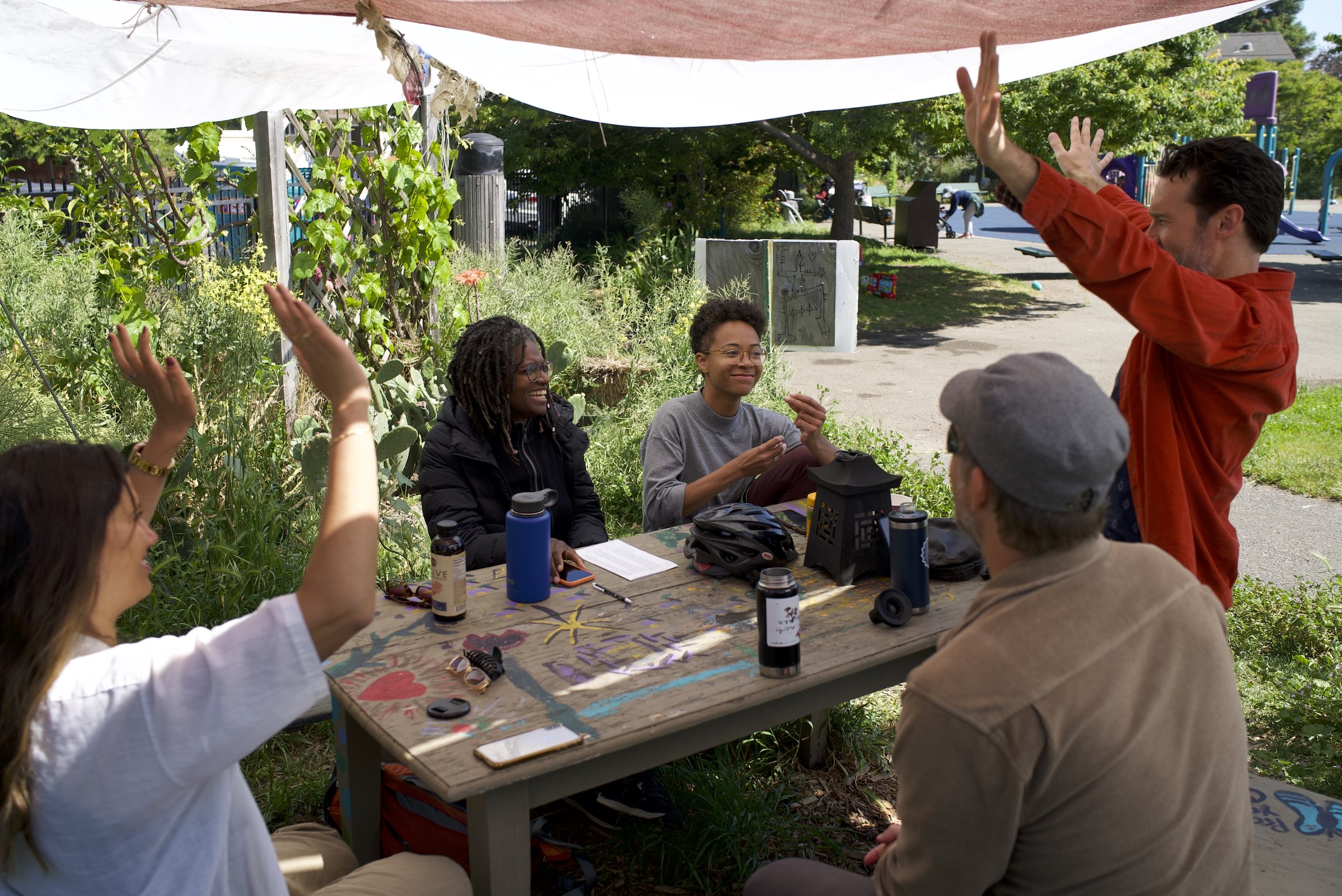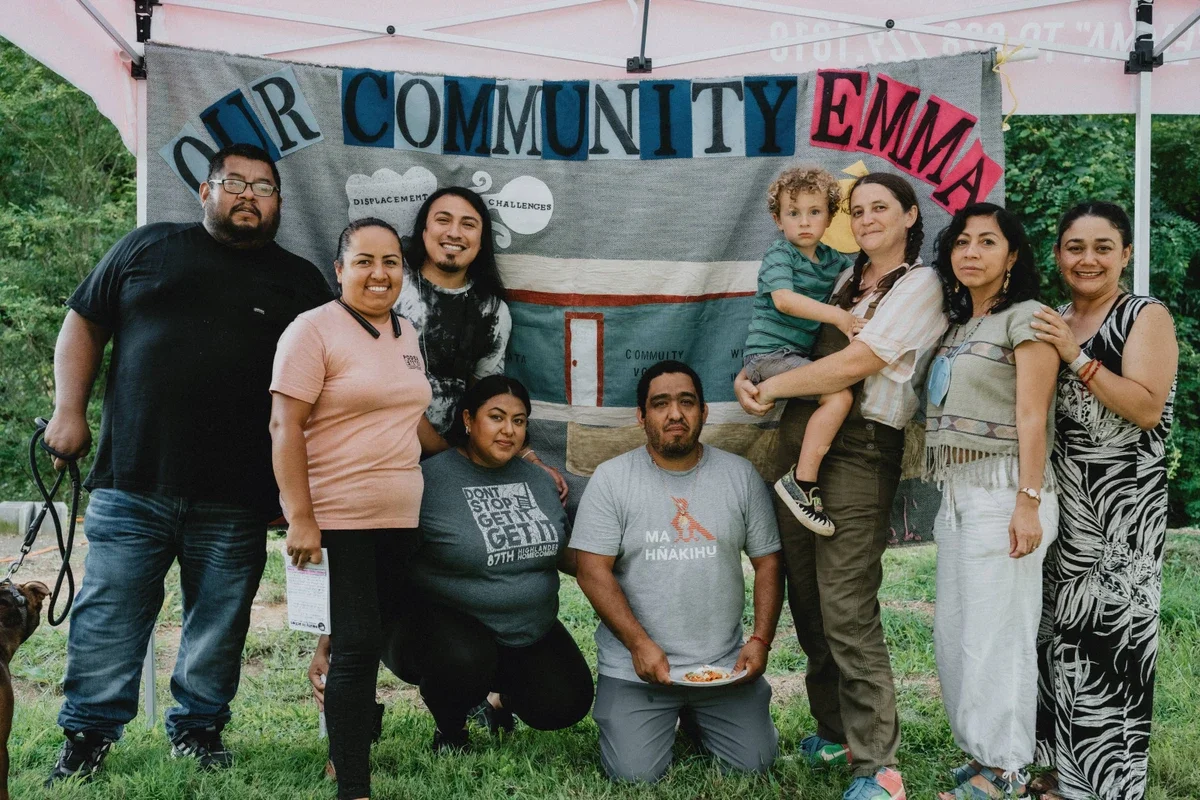Shawn (standing, in red) at our LIFT retreat in 2022
Hey community, Shawn Berry here, partner and worker-owner at LIFT Economy. If you've followed our work, you know we're deeply committed to transforming the economic system. You might also know about our Next Economy MBA program, which we've been facilitating since 2018. Many assume we built this program primarily as a revenue stream, or perhaps to simply educate the next generation of "conscious capitalists." And while we certainly value the exchange our programs offer, I'm here to share a more profound, and perhaps unexpected, truth behind our enduring motivation.
Our deepest reason for creating the Next Economy MBA is not merely about teaching business fundamentals; it's about cultivating the vibrant community and collective momentum essential for a fundamental cultural shift towards an economy that truly nurtures life. This isn't just an academic exercise for us; it's a heartfelt offering for humanity's future.
The current "Business as Usual" (BAU) economy, driven by insatiable growth and profit maximization, is leading to accelerating social, ecological, and psychological collapse. We see widespread suffering: a racial wealth chasm, millions going hungry despite abundant food, rampant species extinction, and global climate chaos. This system simply isn't working for the vast majority of people or the planet.
But here's the revelation: this isn't a call to austerity or endless struggle. We believe that actualizing this new reality means less stress, less screen time, and more joy and play in our lives. It means remembering that humanity hasn't even scratched the surface of the abundance, joy, connection, peace, and reliable prosperity possible for all beings.
Insights from Unexpected Places: Our Philosophical Compass
This journey of reimagining and rebuilding isn't guided by wishful thinking. It's deeply informed by insights from diverse wisdom traditions and rigorous research:
The Harvard Study of Adult Development: This 8 decade long research, highlighted by its director Dr. Robert Waldinger, reveals a profound truth: good relationships keep us happier and healthier. Period. The study underscores the primacy of relationships and the diminishing importance of wealth for well-being. It directly addresses the growing loneliness epidemic, a pervasive issue in the BAU economy. This study reinforces our conviction that a life-nurturing economy must prioritize connection, belonging, and healing over endless accumulation. As the study suggests, a happy life isn't about personal achievement, but about strengthening relationships.
Gesturing Towards Decolonial Futures (GTDF): This arts/research collective offers a powerful framework for navigating our current moment. GTDF works at the intersection of examining historical and ongoing harm, and exploring the unsustainability of modern economies and dominant ways of being. Their practice involves "hospicing worlds that are dying within and around us with care and integrity" while "assisting with the birth of new, potentially wiser possibilities". This includes confronting our complicity in violence, "composting our individual and collective shit with humility," and interrupting modern-colonial addictions to consumption—whether of knowledge, experiences, or even relationships themselves. GTDF calls for recognizing that "we are an extension of the land-metabolism that is the planet, not the other way around," preparing us for "the end of the world as we know it" while showing up differently for "another end of the world" to become possible.
These seemingly disparate sources converge on a singular truth: the path to a flourishing future is found not in more consumption, more extraction, or more isolated individualism, but in deepening our relationships, recognizing our interdependence with the living world, and embracing collective, regenerative action.
Living Proof: The Collective in Action
The idea of a "Next Economy" might sound aspirational, even utopian, but the truth is: it's already happening! Across the globe, incredible organizations and movements are embodying the principles we teach in our MBA, serving as beacons of possibility and demonstrating that another world isn't just possible, it's being built right now. At LIFT, our mission is to "create, model, and share a racially just, regenerative, and locally self-reliant economy that works for the benefit of all life". We do this by focusing on ten core principles for Next Economy enterprises. Here are just a few examples of how these principles are being lived:
Meeting Basic Needs & Sharing Ownership:
The East Bay Permanent Real Estate Cooperative (EBPREC) in Oakland is a Black- and Indigenous-led multi-stakeholder cooperative revolutionizing housing, creating pathways for everyday people to acquire and co-steward land and housing, explicitly building wealth for disenfranchised groups.
Photo: Homeboy Industries
Homeboy Industries, a nonprofit, offers job training and support services through social enterprises for formerly incarcerated and gang-involved individuals, providing essential goods and services like baked goods and recycling, making it "the largest and most successful gang intervention, rehab, and re-entry program in the world."
Democratizing Governance & Supporting Local Communities:
The U.S. Federation of Worker Cooperatives (USFWC) is the national grassroots membership organization building a thriving ecosystem for worker-owned businesses, powering movements for racial justice and economic democracy. They provide technical assistance, advocate for policy changes, and foster education.
Photo: Our Table Cooperative
Our Table Cooperative in Oregon is a multi-stakeholder cooperative where workers, producers, and consumers share ownership, profits, and governance, fostering a new farm-to-table paradigm.
Promoting Open Source & Regenerating Systems:
GreenWave helps build a regenerative ocean farming industry, open-sourcing their polyculture system for seaweeds and shellfish that require no inputs while sequestering carbon and rebuilding ecosystems.
Photo: World Centric
World Centric, a Certified B Corp, sells compostable food containers and donates 25% of its profits to grassroots social and environmental organizations, providing a renewable alternative to single-use plastics.
Developing People & Building Movements:
Zingerman’s in Michigan, a collection of ten partially integrated small businesses, practices Open Book Management, where workers gather weekly to discuss numbers, offer proposals, and make decisions, fostering a deep sense of ownership and financial literacy.
Photo: Seed Commons
Seed Commons is a national network of non-extractive loan funds, channeling investment to marginalized communities and cooperatively-owned businesses, building critical infrastructure for a just, democratic, and sustainable Next Economy.
If you're ready to join us in this vital work of midwifing a new world into being, we invite you to explore the resources on our website, consider joining an upcoming Next Economy MBA cohort, or simply reach out and connect. Your participation is essential.
Think of it like tending a garden: The traditional MBA teaches you how to maximize the yield of a single, often monoculture, crop—perhaps at the expense of the soil and the wider ecosystem. Our Next Economy MBA, however, is about learning to cultivate a thriving, biodiverse food forest, where every element supports the health of the whole, and the harvest brings joy and sustenance to everyone, year after year.
Thank you for helping us hospice out the old economy and midwife in the new.
Our Humble Approach: Learning Together
We at LIFT Economy are deeply committed to this transformation. We don't pretend to have all the answers; the process is emergent, and we are continually learning and unlearning. We know that transitioning to an economy that works for all life demands collective intelligence, courage, and a willingness to transcend binary “us vs. them” thinking. It means embracing a sustainable cooperative culture that balances healthy collaboration with discerning action. Our goal is to compassionately hospice out the BAU economy and midwife in the Next Economy.
The challenges we face—from economic inequality to climate change—are systemic, and no single entity can solve them alone. We believe that by federating and collaborating, Next Economy organizations can influence existing structures and cultivate new norms.
Join the Collective Journey
Our Next Economy MBA program is not just a course; it's a portal for connection, a training ground for collaboration, and a crucible for collective action. It’s where like-minded leaders and entrepreneurs connect, learn the tools of the Next Economy, and become part of a movement bigger than themselves. We believe in co-creating an economy that works for the benefit of all life, together.
Imagine a world where the very act of doing business fosters joy, reduces stress, and allows for deeper human connection, less reliant on the endless hum of screens and the pressure of constant productivity as defined by the old world. This isn't a fantasy; it's the emergent reality being built by communities of practice around the globe.







